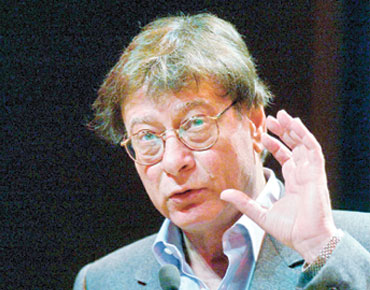www.aljazeerah.info
Opinion Editorials, April 2017
Archives
Mission & Name
Conflict Terminology
Editorials
Gaza Holocaust
Gulf War
Isdood
Islam
News
News Photos
Opinion Editorials
US Foreign Policy (Dr. El-Najjar's Articles)
www.aljazeerah.info
Elevating Palestinians to Confront the Zionist Narrative that Denies their Humanity By James J Zogby April 3, 2017 |
 |
 |
 |
| Palestinian and pan-Arab Poet Mahmoud Darwish | Palestinian singer and Arab Idol, Muhammed Assaf |
Elevating Palestinians to Confront the Zionist Narrative
It was 40 years ago that I co-founded the Palestine Human Rights Campaign (PHRC) and wrote "Palestinians, the Invisible Victims". I was concerned that in the American mind the Israeli-Palestinian conflict had been reduced to a simple equation: Israeli humanity versus the Palestinian problem.
When most Americans thought of the conflict they were able imagine Israelis as people just like us. They were parents who loved their families. They wanted what we wanted—peace, prosperity, and a chance to watch their children grow and realize their dreams. They had names and faces. They experienced pain and loss. They were real.
Palestinians, on the other hand, were, at best, presented as an abstraction. They were objectified into a faceless mass, without names or personalities. When spoken of at all, they were refugees or terrorists or, after a conflict, mere numbers in a body count. We did not know them as individual people and what we did know was cast in negative stereotypes. The only emotions we ascribed to them were that they were angry and violent and not to be trusted. They were not people to be supported, but a problem to be solved.
It was through this lens that most Americans, both policy makers and the public, at large, viewed the conflict. When given the choice between a people or a problem, is was an easy call to support the Israeli people.
This framing of the issue was not by accident. Rather it was the result of a systematic campaign to dehumanize the one side while humanizing the other. It was best captured by the 1960's propaganda film "The Exodus" which transposed the then popular American narrative of pioneers confronting the Indians onto the story of "courageous Israelis" fighting the savage "Arab natives".
During the following decades, this framing of the conflict continued. In 1981, I reported on TV news coverage of a cross border confrontation between Israel and the PLO in Lebanon. On the first day, two Israelis were killed. TV cameras were there interviewing weeping family members, telling their story of fear and pain. The next day Israeli jets bombed the Fakhani neighborhood in West Beirut killing over 383 Lebanese and Palestinian civilians. That night, the TV cameras were again in Northern Israel with more follow up interviews. There was no coverage from Lebanon, just reports of an Arab body count. When the TV coverage did occur a day later, the reporter stood at the end of a bombed out street showing massive destruction. No one was interviewed, no personal stories were told. In Israel the story was the people, in Lebanon it was the buildings and a body count.
In 1994 when Baruch Goldstein, a young American-Israeli terrorist massacred 29 Muslim worshipers in a Hebron mosque, the Washington Post did a major feature piece trying to understand what happened to turn the young man to violence. The faces, names, and ages of the Palestinian victims never made it into print. Goldstein was the story; his victims were invisible. A few years later a 3 month Israeli baby was murdered by a Palestinian sniper. The story was front page news for three days with pictures and interviews with the weeping parents. When, just days later, a 3-day old Palestinian baby was murdered by an Israeli sniper—no major paper picked up the story. It was only reported on the seventh line of a short AP story. No name was given and the parents were not interviewed. It was as if their child and their pain did not matter.
Palestinian invisibility and/or objectification continues to define the conflict today. Even the most progressive voices in Congress don't speak about Palestinians. Instead they advocate for a "two state solution" to preserve Israel a Jewish democratic state. A liberal pro-Israel group periodically puts full page ads in the New York Times and the Washington Post calling for two states making the obscene argument of the demographic threat to the Israel's Jewishness posed by the Palestinian birthrate.
Unfortunately, oftentimes progressives unconsciously contribute to this by failing to elevate Palestinian humanity. Their efforts focus on condemning Israeli policies (which, no doubt, deserve condemnation), calling for boycotts, divestment, and sanctions (BDS) against the State of Israel. While I support BDS, I fear that at times the case for BDS is made without telling the personal stories of Palestinian victims of occupation. Instead of elevating Palestinians, punishing Israel becomes the goal.
And so the problem remains—Americans still do not know Palestinians as real people and, as a result, do not care about them. Because this remains the challenge we face, I have decided that 100 years after Balfour, 70 years after the partition, and 50 years after the 1967 war, I will go back to my roots to tell the Palestinian story. To do so will inevitably confront the Zionist narrative that has denied not only Palestinian humanity but their very existence as a people with a history. I want to elevate Palestinian poets and artists. I want to spend my energy elevating the Palestinian narrative, putting flesh on the bones of the Palestinian experience, and challenging Americans to know Palestinians as real people who want and deserve justice, equality, peace, prosperity and as parents who love their families and want to see their children grow and realize their dreams.
Some may find this threatening because it challenges the fundamentally racist equation that has defined this conflict for a century. So be it.
***
Share the link of this article with your facebook friends
|
|
|
|
||
|
||||||


